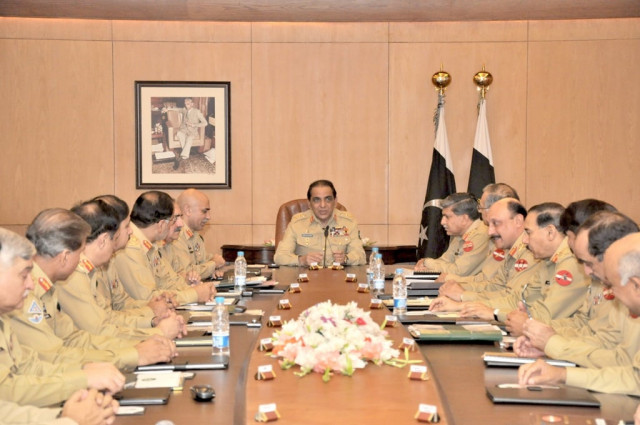Reading the military’s message
The Pakistan Army clearly stands with the people of Pakistan since most of them also seem to dislike America.

The statement wants Pakistanis to stand united. It vows political neutrality but may have shown the military’s hand a bit on the subject of the establishment of a joint commission by the government in the follow-up to the parliamentary joint resolution: “Some quarters, because of their perceptual biases, were trying to deliberately run down the armed forces and the army in particular”. If this is intended at the criticism in the media following the Abbottabad raid and the PNS Mehran attack, then one has to see that much of what the media is saying is an accurate reflection of public sentiment. Many people are angered by the fact that a major chunk of the annual budget goes to the armed forces and for that they expect better results in terms of fighting off terrorists, securing their own installations or even in tracking down the world’s most-wanted terrorist.
Another point mentioned in the statement is that US assistance meant for the military be diverted towards economic aid “which can be used for reducing the burden on the common man”. This rejection of American assistance by the army is based on the following numbers which must come as a surprise to all in Pakistan. Instead of the $13-15 billion in military aid, the civilian government got only $8.6 billion, out of which only $1.4 billion were given to the army over the last decade! The world has been led to believe, however, that the Musharraf government received $10 billion as civilian aid, which it heavily diverted to the army. Releasing these figures would suggest that the army wants to dispel the notion that it is the biggest beneficiary of US aid. That said, it should be understood that the issue shouldn’t be that of the Pakistani military having a direct relationship with the US military but rather that it work with the Pentagon along the parameters set for it by parliament and the elected government of the day.
As for public sentiment, it would be fair to say that the Pakistan Army clearly stands with the people of Pakistan since most of them also seem to dislike America. It stands also with the ‘Voice of the People’ in parliament, which has issued a strong directive to the army — supported by all political parties — to end drone attacks, if need be by ending Nato supplies through Pakistan. But the statement has a message for the people of North Waziristan Agency too, asking them to get rid of the ‘foreigners’ in their midst and defend their territory — a clear pointer to the army’s intent of sooner or later going after the terrorists in North Waziristan. Perhaps we may also see a change of policy insofar as the seeming tolerance of various jihadi outfits is concerned. If that happens, that would be good for Pakistan.
The military’s statement must be examined carefully, in particular by the US, since it must see why so much of its pledged assistance has not been delivered. The opinion in Washington is divided, but those in office think the US cannot do without Pakistan if it wants to fight al Qaeda. Those who oppose this view point to the anti-Americanism within the military, its isolationist India-centric mindset and the infection of sympathy for extremists within some in its ranks. In the final count, the question that must be asked is: How realistic is the objective that parliament set before the army (in the former’s joint resolution)? Politics may get a fillip from exaggeration and hyperbole but wars are not undertaken on the basis of jazba. One journalist died revealing the odds facing Pakistan, indirectly stressing the need to avoid isolation through rejection of international support. Soon the ‘national consensus’ may come to be built on coercion and fear of death.
Published in The Express Tribune, June 11th, 2011.















COMMENTS
Comments are moderated and generally will be posted if they are on-topic and not abusive.
For more information, please see our Comments FAQ